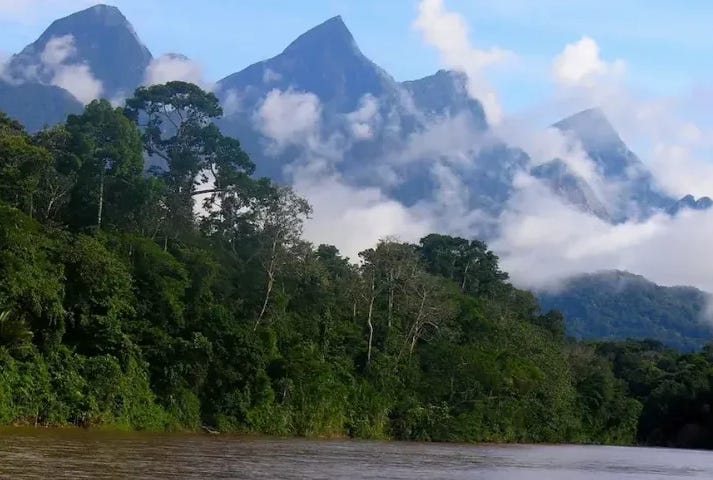Is Shell losing interest in one of its flagship carbon offsets projects?
The Cordillera Azul project in Peru has been severely criticised since the company last bought credits

Two and a half years ago, in March 2023, the UK oil and gas company Shell told the Associated Press (AP) that it would conduct an “additional review” before buying more carbon credits from an offsets project involving the Cordillera Azul National Park in the Peruvian Amazon. Along with French company TotalEnergies, Shell is one of that project’s two biggest backers. According to Peru’s Environment Ministry (MINAM), as of March 2024 it had bought directly from the project operator approximately 47% - more than 14 million - of all the credits that Cordillera Azul had generated, while Total had bought 42% - almost 13 million - of them.
Shell’s commitment to that review was reported by AP at the end of the second of three stinging articles it published about the project. That article was titled simply but rather underwhelmingly: ““Gone wrong”: Doubts on carbon-credit program in Peru forest.”
“Doubts”? Well, that’s one way of putting it. And as for going wrong. . . it isn’t that the project went wrong: there was something wrong with it right from the start.
But how, 30 or so months later, is Shell’s review coming along? That question is particularly worth asking not just within the context of carbon offsetting in general and the fundamental methodological problems associated with so many projects, as most recently documented in a paper in the Annual Review of Environment and Resources published this month, but because of the ongoing human rights struggles with which Cordillera Azul is implicated. As summarised in a briefing paper released yesterday by the NGO Forest Peoples Programme (FPP), those struggles are the result of a sizeable chunk of the park - and therefore the project area - being indigenous people’s ancestral territory.
Indeed, last month indigenous people from five countries - Bolivia, Colombia, Ecuador, Paraguay, Peru - met in a Kichwa community near the park to discuss carbon offsetting specifically. They released a statement which described it as a “false solution” to climate change that is violating their “fundamental rights”, and which named both Shell and Total in particular, as well as other various companies, in addition to the NGO, CIMA, which runs the Cordillera Azul project.
When I asked Shell about its promise to AP to conduct a review, the company’s initial reply was an apparently clumsy one. “Given there has been no project update to the baseline and Shell has not bought credits from the project for over two years (since before May 2023), there has been no need for Shell to conduct an internal review,” a spokesperson says. “We continue to monitor the situation.”
In other words, Shell promised it wouldn’t buy more credits from the project before conducting a review, but then over two years later it says there has been no need for a review because it hasn’t bought more credits!
Is this some kind of “Catch-22”?
It’s hard not to wonder if Shell is losing interest in Cordillera Azul. According to MINAM, the company first bought credits in 2014 - more than 7.5 million - and then again in 2018 - over 6.5 million - while Shell itself tells me it bought another 24,100 in November 2022. But since then, almost three years ago, there has been nothing.
Meanwhile, the project has come in for a severe battering - from Kichwa in Peru taking legal action, issuing public statements and holding protests, from media such as AP, myself, The Guardian, SourceMaterial, CarbonBrief, Zeke, Greenpeace’s journalism unit Unearthed, German TV channel Das Erste and a South Korean public broadcasting company, from NGOs such as FPP, Rainforest Foundation UK and Friends of the Earth-Netherlands, from academics at the University of California, Berkeley, from the authors of a UK parliamentary research briefing, and even from the United Nations’ Committee on the Elimination of Racial Discrimination.
Then there’s the fact that the pride-of-place previously accorded the project across Shell’s websites has been diminished too, with the banner photo of the Cordillera itself gone and information about it much reduced, although the latter could also be said about other projects the company has been involved with.
“It looks to me like Shell could be trying to walk away from Cordillera Azul,” I say to the company. “No credits bought for some years, reduced website blurb, and the promise about not buying more credits until you’ve done a review but not needing to do a review because you haven’t bought more credits, which, if you extend that logic, means you’re never going to buy any more credits! Not to mention all the ferocious criticism. What would you say to that?”
“What we said to AP in 2023 still stands,” a Shell spokesperson says. “We will conduct a review before we buy more credits.”
